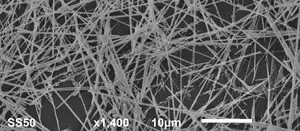(Press-News.org) Does electromagnetic radiation emitted by mobile phones affect semen quality? While various environmental and lifestyle factors have been proposed to explain the decline in semen quality observed over the last fifty years, the role of mobile phones has yet to be demonstrated. A team from the University of Geneva (UNIGE), in collaboration with the Swiss Tropical and Public Health Institute (Swiss TPH), has published a major cross-sectional study on the subject. It shows that frequent use of mobile phones is associated with a lower sperm concentration and total sperm count. However, researchers did not find any association between mobile phone use and low sperm motility and morphology. Read the results in Fertility & Sterility.
Semen quality is determined by the assessment of parameters such as sperm concentration, total sperm count, sperm motility and sperm morphology. According to the values established by the World Health Organization (WHO), a man will most probably take more than one year to conceive a child if his sperm concentration is below 15 million per milliliter. In addition, the percentage chance of pregnancy will decrease if the sperm concentration is below 40 million per milliliter.
Many studies have shown that semen quality has decreased over the last fifty years. Sperm count is reported to have dropped from an average of 99 million sperm per millilitre to 47 million per millilitre. This phenomenon is thought to be the result of a combination of environmental factors (endocrine disruptors, pesticides, radiation) and lifestyle habits (diet, alcohol, stress, smoking).
Assessing the impact of mobile phones
Is the mobile phone also to blame? After conducting the first national study (2019) on the semen quality of young men in Switzerland, a team from the University of Geneva (UNIGE) has published the largest cross-sectional study on this topic. It is based on data from 2886 Swiss men aged 18 to 22, recruited between 2005 and 2018 at six military conscription centres.
In collaboration with the Swiss Tropical and Public Health Institute (Swiss TPH), scientists studied the association between semen parameters of 2886 men and their use of mobile phones. ‘‘Men completed a detailed questionnaire related to their lifestyle habits, their general health status and more specifically the frequency at which they used their phones, as well as where they placed it when not in use,’’ explains Serge Nef, full professor in the Department of Genetic Medicine and Development at the UNIGE Faculty of Medicine and at the SCAHT – Swiss Centre for Applied Human Toxicology, who co-directed the study.
These data revealed an association between frequent use and lower sperm concentration. The median sperm concentration was significantly higher in the group of men who did not use their phone more than once a week (56.5 million/mL) compared with men who used their phone more than 20 times a day (44.5 million/mL). This difference corresponds to a 21% decrease in sperm concentration for frequent users (>20 times/day) compared to rare users (<1 time>
Is 4G less harmful than 2G?
This inverse association was found to be more pronounced in the first study period (2005-2007) and gradually decreased with time (2008-2011 and 2012-2018). ‘‘This trend corresponds to the transition from 2G to 3G, and then from 3G to 4G, that has led to a reduction in the transmitting power of phones,’’ explains Martin RÖÖsli, associate professor at Swiss TPH.
‘‘Previous studies evaluating the relationship between the use of mobile phones and semen quality were performed on a relatively small number of individuals, rarely considering lifestyle information, and have been subject to selection bias, as they were recruited in fertility clinics. This has led to inconclusive results,’’ explains Rita Rahban, senior researcher and teaching assistant in the Department of Genetic Medicine and Development in the Faculty of Medicine at the UNIGE and at the SCAHT, first author and co-leader of the study.
It doesn’t matter where you put your phone
Data analysis also seems to show that the position of the phone - for example, in a trouser pocket - was not associated with lower semen parameters. ‘‘However, the number of people in this cohort indicating that they did not carry their phone close to their body was too small to draw a really robust conclusion on this specific point,’’ adds Rita Rahban.
This study, like most epidemiologic studies investigating the effects of mobile phone use on semen quality, relied on self-reported data, which is a limitation. By doing so, the frequency of use reported by the individual was assumed to be an accurate estimate of exposure to electromagnetic radiation. To address this limitation, a study funded by the Federal Office for the Environment (FOEN) was launched in 2023. Its aim is to directly and accurately measure exposure to electromagnetic waves, as well as the types of use - calls, web navigation, sending messages - and to assess their impact on male reproductive health and fertility potential. The data will be collected using an application that each future participant will download to their mobile phone. The research team is actively recruiting participants for this study.
The aim is also to better describe the mechanism of action behind these observations. ‘‘Do the microwaves emitted by mobile phones have a direct or indirect effect? Do they cause a significant increase in temperature in the testes? Do they affect the hormonal regulation of sperm production? This all remains to be discovered,’’ concludes Rita Rahban.
END
Mobile phone use may affect semen quality
A team from UNIGE and Swiss TPH has published a large study covering more than a decade of data on the effects of mobile phones on semen quality of young men
2023-11-01
ELSE PRESS RELEASES FROM THIS DATE:
Study finds JAK inhibitors, common treatment for arthritis, are effective
2023-11-01
According to a new paper in Rheumatology, published by Oxford University Press, JAK inhibitors, which doctors have used to treat patients with arthritis despite concerns about the effectiveness of such drugs, actually do work quite well. In a multicenter, retrospective study Japanese researchers found that the drugs resulted in impressive remission rates in patients, most of whom choose to continue such treatment.
Rheumatoid arthritis is a common autoimmune disease characterized by chronic inflammation of joint linings and results in progressive joint destruction and other systemic ...
Do mild depressive and anxiety symptoms in fathers predict behavioral and cognitive problems in their children?
2023-11-01
While the role of mothers’ stress, anxiety and depression on children’s behavioral and cognitive development is well established, less is known about the connection between fathers’ mental health and children’s development.
Now, a team of researchers affiliated to different institutions across Quebec, Canada has examined if paternal anxious and depressive symptoms, measured during their partner’s pregnancy, and again six to eight years later, are associated with children’s cognitive function and behavior. They studied this association ...
Cancer drug could hold hope for treating inflammatory diseases including gout and heart diseases
2023-11-01
A cancer drug currently in the final stages of clinical trials could offer hope for the treatment of a wide range of inflammatory diseases, including gout, heart failure, cardiomyopathy, and atrial fibrillation, say scientists at the University of Cambridge.
In a study published today in the Journal of Clinical Investigation, the researchers have identified a molecule that plays a key role in triggering inflammation in response to materials in the body seen as potentially harmful.
We are born with a defence system known as innate immunity, which acts as the first line of defence against harmful materials in the body. Some of these materials will come from outside, such as bacterial or viral ...
New cancer drug shows promise targeting genetic weakness in tumors, comments Virginia Tech expert
2023-11-01
Imagine the body’s cells are well-behaved students in the classroom. The “teachers” are tumor suppressor genes, and they make sure cells follow the rules. But when tumor suppressor genes are away, cells may go astray.
With cells, this is a serious matter. Unregulated behavior can lead to uncontrolled growth and, ultimately, the development of cancer.
In an invited review article Wednesday (Nov. 1, 2023) in Cancer Discovery, a journal of the American Association for Cancer Research, Kathleen Mulvaney, assistant professor with the Fralin Biomedical Research Institute at VTC, talks about the ...
Marine oxygen landscape shaped by plate movement and biological innovation
2023-11-01
The oxygen content of seawater has a profound impact on the cycling of bioessential elements and the habitability of Earth. But how and why the marine oxygen landscape (i.e., the spatial pattern of oxygen levels) evolved since the start of the Phanerozoic 538 million years ago is not well established.
To tackle this problem, researchers led by Prof. WANG Xiangli from the Institute of Geology and Geophysics of the Chinese Academy of Sciences (IGGCAS) and Prof. LI Chao from the Chengdu University of Technology, along with collaborators from the University of Cincinnati and the Nanjing Institute of Geology and Palaeontology, have reconstructed a nearly continuous record of ...
Having a bad boss makes you a worse employee
2023-11-01
uIf your boss stomps and yells, criticizes you, and then proceeds to take the credit for your work – even it is an isolated incident – it can take a profound toll on employee well-being and performance. But despite the many years of research, the precise mechanisms through which bad leadership impacts employees’ performance remain a subject of interest.
In a new study, first published online Oct. 30 in Group & Organization Management, an international group of researchers, led by Stevens Institute of Technology and University of Illinois Chicago, offer a novel explanation of the cognitive factors through which abusive ...
Non-invasive technology maps brain activity to investigate behavior changes in neurological disease
2023-11-01
A research team led by Cleveland Clinic and Oregon Health and Science University (OHSU) has developed a new method for mapping how the parts of the brain "speak" to each other, critical to understanding behavior changes in patients with neurological disease.
Diseases like Alzheimer's disease change how patients communicate and act, affecting their relationships and well-being. Cleveland Clinic's Hod Dana, PhD, is collaborating with Jacob Raber, PhD, an OHSU behavioral neuroscientist, on ...
NIH funding helps Ghose Lab invest in innovative imaging equipment
2023-11-01
UTA will soon add a new piece of cutting-edge equipment to its already impressive and growing research armamentarium—a type of super-resolution microscope (SRM) that allows biologists to see structures within a cell in even finer detail.
The SRM will come to UTA because of additional grant funding from the National Institutes of Health (NIH) to the lab of Piya Ghose, an assistant professor of biology at UTA. This nearly $250,000 award supplements Ghose’s existing NIH/National Institute of General Medical ...
Domestic violence involving firearms increased during COVID-19 pandemic
2023-11-01
(SACRAMENTO, Calif.) — Domestic violence went down or stayed the same during the first 10 months of the COVID-19 pandemic in five major U.S. cities. However, domestic violence involving firearms increased in three of those cities, according to a new UC Davis study published in the Journal of Family Violence.
“The increase in firearm domestic violence is concerning, as abuser firearm access is a risk factor for lethality,” said Elizabeth Tomsich, a research data analyst at the UC Davis Violence Prevention Research Center and ...
Microbiology: River plastics may harbour potential pathogens and antimicrobial resistance genes
2023-11-01
Microbial communities growing on plastic debris in rivers may have the capacity to harbour potentially pathogenic microbes and act as reservoirs of antimicrobial resistance genes, according to a study published in Microbiome. The findings also highlight differences in the potential pathogens and antimicrobial resistance genes that new and degraded plastics may have the capacity to harbour.
Vinko Zadjelovic, Elizabeth Wellington, Joseph Christie-Oleza and colleagues characterised the microbial communities found on the surface ...
LAST 30 PRESS RELEASES:
Deforestation in the Amazon raises the surface temperature by 3 °C during the dry season
Model more accurately maps the impact of frost on corn crops
How did humans develop sharp vision? Lab-grown retinas show likely answer
Sour grapes? Taste, experience of sour foods depends on individual consumer
At AAAS, professor Krystal Tsosie argues the future of science must be Indigenous-led
From the lab to the living room: Decoding Parkinson’s patients movements in the real world
Research advances in porous materials, as highlighted in the 2025 Nobel Prize in Chemistry
Sally C. Morton, executive vice president of ASU Knowledge Enterprise, presents a bold and practical framework for moving research from discovery to real-world impact
Biochemical parameters in patients with diabetic nephropathy versus individuals with diabetes alone, non-diabetic nephropathy, and healthy controls
Muscular strength and mortality in women ages 63 to 99
Adolescent and young adult requests for medication abortion through online telemedicine
Researchers want a better whiff of plant-based proteins
Pioneering a new generation of lithium battery cathode materials
A Pitt-Johnstown professor found syntax in the warbling duets of wild parrots
Cleaner solar manufacturing could cut global emissions by eight billion tonnes
Safety and efficacy of stereoelectroencephalography-guided resection and responsive neurostimulation in drug-resistant temporal lobe epilepsy
Assessing safety and gender-based variations in cardiac pacemakers and related devices
New study reveals how a key receptor tells apart two nearly identical drug molecules
Parkinson’s disease triggers a hidden shift in how the body produces energy
Eleven genetic variants affect gut microbiome
Study creates most precise map yet of agricultural emissions, charts path to reduce hotspots
When heat flows like water
Study confirms Arctic peatlands are expanding
KRICT develops microfluidic chip for one-step detection of PFAs and other pollutants
How much can an autonomous robotic arm feel like part of the body
Cell and gene therapy across 35 years
Rapid microwave method creates high performance carbon material for carbon dioxide capture
New fluorescent strategy could unlock the hidden life cycle of microplastics inside living organisms
HKUST develops novel calcium-ion battery technology enhancing energy storage efficiency and sustainability
High-risk pregnancy specialists present research on AI models that could predict pregnancy complications
[Press-News.org] Mobile phone use may affect semen qualityA team from UNIGE and Swiss TPH has published a large study covering more than a decade of data on the effects of mobile phones on semen quality of young men






